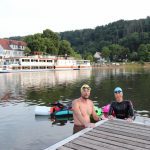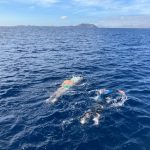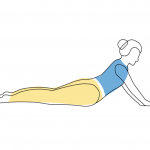Why the EC6 didn’t fail
Last week, six very fast swimmers set out from Dover in a very public attempt to beat the record for the fastest ever relay crossing of the English Channel. They fell short by 11 minutes, so you could say they failed. End of story.
But it’s not quite like that.
Before going any further, I have to admit a vested interest. When Wayne Soutter, the team manager and the organiser behind the attempt first had the idea of putting together a team of over-40-year olds for a fast English Channel relay swim, he asked me if I wanted to take part and I said yes. As Wayne’s ideas developed and he did a bit of research he decided he wanted to assemble a group that could have a crack at the record. At this point I told him that if he wanted the record he would need to find faster swimmers than me and I suggested some names. Much as I would have liked to have been part of the team I knew I simply wasn’t quick enough and this was confirmed when I joined three of the team (David Warren, Andrew Chamberlain and Steve West) for a training session at Hampton Lido. I was half a length behind after just four lengths.
Still, Wayne very kindly kept me on as a reserve for the team but he wisely lined up two other faster swimmers to step in if necessary. In the end, none of the reserves were needed. I was quite relieved not to get the call as I would have felt I’d let the side down.
The record for an English Channel relay is 6hrs52. The distance is 21 miles. That means swimming at a pace of just over three miles per hour, which is equivalent to swimming at a pace of 1:13 per hundred metres – and that’s if you can follow a perfectly straight line. The reality is that the swimmers needed to go faster, and there aren’t many swimmers in the world, over 40, who are able to do that for an hour in the ocean. I certainly can’t but Wayne found six who can.
We should also factor in that the original record was set by a US national team – a group of full-time international swimmers in their prime. The EC6 are all over 40 and all juggle training with work and family commitments. It was audacious, to say the least, to think they could break the record – or even have a chance of breaking it. Given the complexities and impact of weather and conditions on Channel swimming there are obviously no guarantees. But the team, and those following them (including sponsors Elivar and Total Immersion), believed they could do it. In the end the record eluded them, but they came tantalisingly close.
Success in open water, I believe, is often found as much in the journey as in the end result. The EC6 set themselves an ambitious target and failed when measured against that extreme and binary measure, but here are some of their successes:
Assembled an international team
New Zealand, Germany, the US and Great Britain were represented in the relay. Wayne is from South Africa.
Fastest six-person relay of the year and second fastest relay ever
While there’s still a chance another team might go faster this year, it’s unlikely, so Total Immersion in the Channel will be the fastest in 2014. They are also the second fastest team ever. The previous CSA records are 7:17, set by Dover Lifeguards Club in 1981, and 6:52 set in 1990 by the US national team as the first leg of a two-way relay.
Showed that the record is beatable
The 11 minute deficit is close enough to show that with perhaps better conditions and a bit of luck with the tides, the world record is beatable. Surely this will inspire others to have a go.
Challenged conventional wisdom on feeding during Channel relays
The team took feeds at 20 and 40 minutes. Usually Channel relay swimmers don’t stop to eat during their hour swim as it’s known you can swim for an hour without. However, the team experimented with extremely fast feeds (less than 5 seconds) and felt they helped them keep focus and momentum during the swim.
Showed that over 40 is not over-the-hill
This was one of the objectives, so definitely a success here. The swim has also started a debate about whether the associations could start to recognise records in specific age categories – for example, all swimmers need to be within a certain age band (say 40-49) or the sum of the swimmers’ ages should exceed a specified number (e.g. a +240 years relay would be six swimmers with a combined age of 240 or more).
No regrets
The swimmers, as far as I know, while disappointed they didn’t get a record have no regrets about taking part. The swim provided a focus and motivation for their training and they learnt a lot about themselves and Channel swimming. With the exception of Christof Wandratsch, none had swum in the Channel before or next to a boat. In fact the majority of the team members are pool swimmers with relatively little open water experience.






